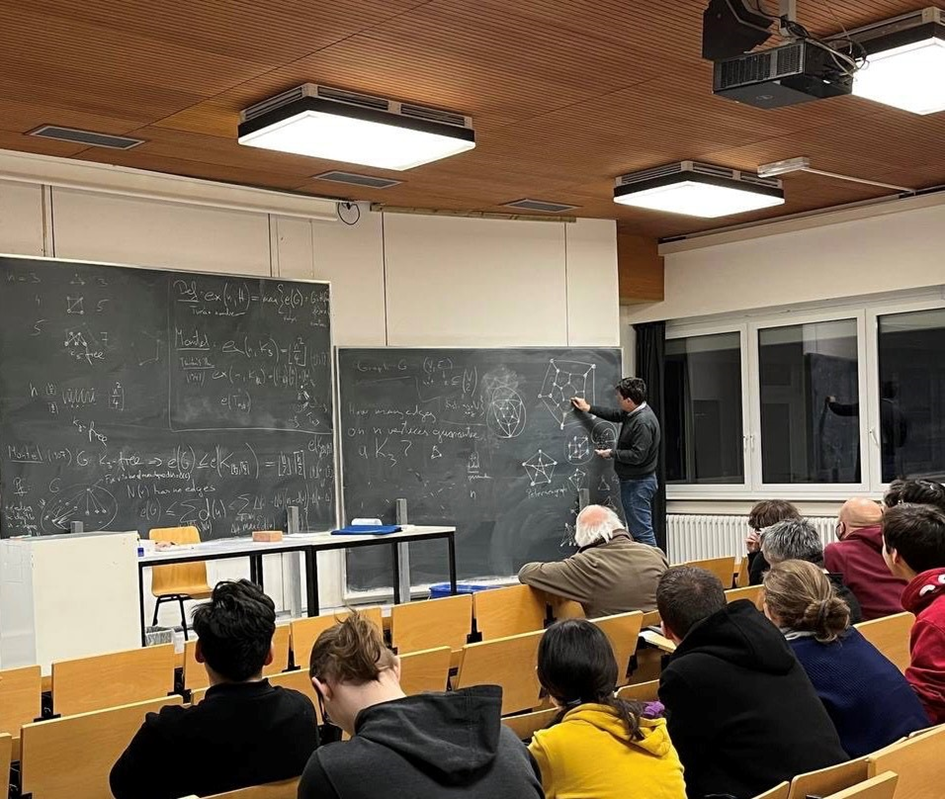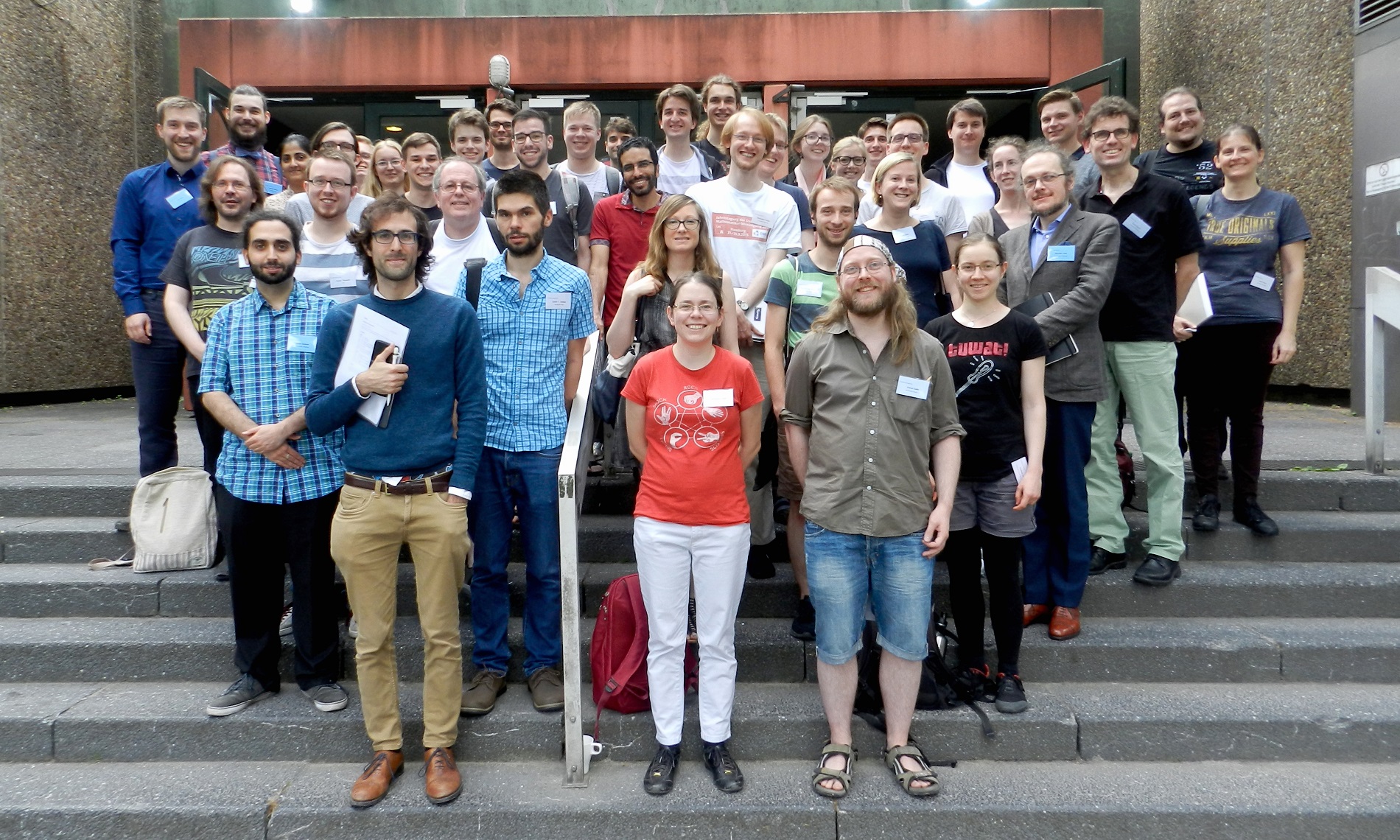Hier sind Projekte aufgeführt, die bisher als DMV-Mathematikschulen gefördert wurden.
„Secrets of the Surface“
14.5.2024, Kinoabend
Anlässlich des Internationalen Tages der Frauen in der Mathematik fand ein Kinoabend an der Freien Universität statt, bei dem die Dokumentation „Secrets of the Surface – The Mathematical Vision of Maryam Mirzakhani“ gezeigt wurde. Mirzakhani war eine iranische Mathematikerin, deren zentrales Forschungsgebiet die Theorie der Modulräume Riemannscher Flächen war. Im Jahr 2014 wurde sie für ihre Arbeiten in diesem Bereich mit der Fields-Medaille ausgezeichnet. Sie ist somit die erste Frau, die diese Auszeichnung bekam. Der Internationale Tag der Frauen in der Mathematik wurde ihr zu Ehren auf ihren Geburtstag am 12. Mai datiert.
„Lokale Systeme in der Algebraischen und Arithmetischen Geometrie“
1.2.2024, Prof. Dr. Dr. h. c. mult. Hélène Esnault
Prof. Hélène Esnault (FU) definierte in ihrem Vortrag Étale Fundamentalgruppen, die in der algebraischen Geometrie vorkommen und im Allgemeinen sehr schwer zu beschreiben sind. Sie gab einen historischen Überblick über die Entwicklung dieses Begriffs und erläuterte, wie man diese Gruppen in der heutigen Forschung durch sogenannte lokale Systeme approximiert. Sie erzählte auch von ihrer eigenen Forschungsarbeit in diesem Bereich und stellte ein Theorem vor, das sie zusammen mit anderen Mathematikern bewiesen hat, welches eine bestimmte Eigenschaft der Fundamentalgruppen in einem Spezialfall beschreibt.
„Rationale Lösungen polynomialer Gleichungen“
18.1.2024, Prof. Dr. Jürg Kramer
In seinem Vortrag gab Prof. Jürg Kramer (HU) einen Überblick über die Theorie von rationalen Nullstellen rationaler Polynome in zwei Variablen. Er zeigte, dass solche Polynome (unendlich) viele rationale Nullstellen haben, wenn deren Grad „klein“ ist, wohingegen sie höchstens endlich viele rationale Nullstellen besitzen, falls deren Grad „groß“ ist. Außerdem erklärte er, dass diese rationalen Nullstellen eine Gruppenstruktur aufweisen, und zeigte einen Irrationalitätsbeweis von √ 2, der Fermats Idee vom unendlichen Abstieg verwendet. Weiterführend erwähnte er andere interessante zahlentheoretische Fragestellungen, wie zum Beispiel das Kongruenzzahlproblem, die Gegenstand aktueller mathematischer Forschung sind.
„Algorithms: from sorting to saddle points“
12.12.2023, Prof. Dr. Laszló Kozma
Prof. Laszló Kozma (FU) hielt einen Vortrag über Sortierprobleme in der Informatik, bei denen eine gegebene Liste an vergleichbaren Objekten anhand ihrer Größe sortiert werden soll. Um die Komplexität eines solchen Problems zu verstehen, kann man einen Algorithmus beschreiben, der das gegebene Problem in einer bestimmten Anzahl an Schritten löst, und anschließend beweisen, dass kein anderer Algorithmus das Problem schneller lösen kann. Laszló erklärte, wie man einen solchen Beweis mathematisch formalisieren kann, und führte das Ganze beispielhaft an einem Ergebnis aus seiner Forschung aus, wo es darum ging, sog. Sattelpunkte zu finden.
„Wie die Mathematik zur Klimadebatte beitragen kann“
7.11.2023, Prof. Dr. Rupert Klein
Prof. Rupert Klein (FU) sprach in seinem Vortrag darüber, welchen großen Einfluss die Mathematik auf die Klimadebatte hat. Er erläuterte, dass die Mathematik unabdingbar in der Klimaforschung sei, in der vielfach mit vereinfachten Gleichungen für Atmosphären- und Ozeansimulationen gearbeitet wird, da sie Aussagen zur Gültigkeit solcher reduzierten Modelle liefern kann. Des Weiteren führte er anhand eines Beispiels aus, wie die mathematische Formalisierung von bestimmten Begriffen den interdisziplinären Diskurs um den Klimawandel strukturieren und Missverständnisse verhindern kann.
„Das 24-Zell“
4.7.2023, Prof. Dr. Günter M. Ziegler
Prof. Günter M. Ziegler (Professor für Mathematik und Präsident der FU Berlin) stellte in seinem Vortrag ein außergewöhnliches mathematisches Objekt vor: das 24-Zell. Dies ist eins der sechs regulären vierdimensionalen Polytope (die sogenannten platonischen Polychora), das als einziges keine Entsprechung im Dreidimensionalen besitzt. Ziegler erklärte, wie man das 24-Zell geometrisch, kombinatorisch und algebraisch beschreiben kann, und welche besonderen Eigenschaften es im Vergleich zu anderen regelmäßigen Polytopen hat. Zum Schluss zeigte er die vielen offenen Forschungsfragen auf, die rund um dieses Objekt noch existieren.
 Prof. Günter M. Ziegler bei seinem Vortrag über das 24-Zell. Foto: Manuel Staiger.
Prof. Günter M. Ziegler bei seinem Vortrag über das 24-Zell. Foto: Manuel Staiger.
„From linear programming to colliding particles“
19.6.2023, Prof. Dr. Raman Sanyal
Prof. Raman Sanyal (FU, Goethe-Universität Frankfurt) berichtete über seine Forschungsarbeit an einem bestimmten Problem, das mit dem sog. Simplexalgorithmus zusammenhängt. Dieses ist ein Verfahren zum Lösen linearer Optimierungsprobleme, das auch eine geometrische Interpretation zulässt. Sanyal erzählte, wie er Schritt für Schritt seiner Lösung näherkam und dabei auf erstaunliche Verbindungen zu anderen mathematischen Teilgebieten stieß. Seine Erzählung zeigte, wie aufregend und vielseitig mathematische Forschung sein kann, und dass ein mathematisches Konzept, in unterschiedliche Roben gehüllt, an verschiedenster Stelle Verwendung finden kann.
„Wie gelingt Wissenschaftsjournalismus in der Mathematik?“
25.5.2023, Dr. Anna Maria Hartkopf
Dr. Anna Maria Hartkopf ist Projektleiterin des MIP.labor, einer Ideenwerkstatt für Wissenschaftskommunikation an der FU Berlin. Als eine der ersten, die in diesem Bereich promoviert hat, sprach sie in ihrem Vortrag über das Wesen und die Relevanz mathematischer Wissenschaftskommunikation, die aufgrund der besonderen Natur der Mathematik spezielle Hürden mit sich bringt. Sie stellte auch die Arbeit des MIP.labor vor, das zusammen mit Wissenschaftsjournalist*innen kreative Medienformate für eine junge Zielgruppe erstellt und durch die wissenschaftliche Evaluation der Projekte gleichzeitig neue Forschungsergebnisse produziert.
„Gitterpunkte und Hodge-Zahlen“
11.5.2023, Prof. Dr. Christian Haase
Prof. Christian Haase (FU) hielt einen Vortrag über torische Varietäten, die eine Verbindung zwischen Algebra und Geometrie herstellen. Er erklärte auf anschauliche Weise am Beispiel des Satzes von Bernstein-Kushnirenko, wie bestimmte Polytope bei der Lösung von algebraischen Gleichungen helfen können. Außerdem stellte er eine Verallgemeinerung des Satzes aus seiner eigenen Forschung vor und zeigte auf, wie viele leicht formulierbare und doch ungeklärte Fragen es auf diesem Gebiet noch gibt.
„How many edges guarantee a small graph pattern?“
7.2.2023, Prof. Dr. Tibor Szabó
In seinem Vortrag sprach Prof. Tibor Szabó (FU) über Turán Zahlen, einem klassischen Thema aus der Graphentheorie. Die Turán Zahl gibt die Anzahl an Kanten an, die mindestens notwendig ist, um in einem Graphen mit n Knoten ein bestimmtes Kantenmuster entstehen zu lassen. Dies kann zum Beispiel ein Dreieck, ein Zyklus einer bestimmten Länge, oder ein vollständiger Graph sein, aber auch ein größeres Muster wie zum Beispiel ein Dodekaeder. Szabó zeigte die Vielfalt an interessanten Theoremen auf, die zu dieser Thematik existieren, und stellte seinen Beweis für ein bestimmtes Resultat aus seiner eigenen Forschungsarbeit vor.
 Prof. Dr. Tibor Szabó, FU Berlin, mit einem Vortrag über ein Thema aus der Graphentheorie. Foto: Elisabeth aus dem Siepen.
Prof. Dr. Tibor Szabó, FU Berlin, mit einem Vortrag über ein Thema aus der Graphentheorie. Foto: Elisabeth aus dem Siepen.
„Wird ein Gigant erscheinen oder nicht?“
5.1.2023, Prof. Dr. Wolfgang König
Prof. Wolfgang König (TU, WIAS) hielt einen Vortrag über ein Thema aus seiner Forschungsarbeit in der angewandten Stochastik. Graphisch unterlegt erklärte er anhand von mehreren Beispielen, unter welchen Umständen in großen Datenmengen durch zufällige Prozesse (wie z.B. dem Einfügen von Kanten zwischen Datenpunkten) plötzlich gewisse gigantische Teilstrukturen auftreten können. Seine Beispiele entsprachen drei verschiedenen Typen von sog. Mikro-Makro-Phasenübergangen, nämlich Perkolation, Bose-Einstein-Kondensation und Gelation. König zeigte die vielen mathematischen Ergebnisse auf, die in diesem Kontext existieren, und von denen viele noch offen sind.
„Perfekt sichere Verschlüsselungsverfahren“
13.12.2022, Prof. Dr. Marian Margraf
In seinem Vortrag führte Prof. Marian Margraf (FU, Fraunhofer AISEC) die Grundlagen von Verschlüsselungsverfahren ein und gab hierzu mehrere Beispiele. Er ging dann ausführlich auf sog. perfekt sichere Verschlüsselungen ein. Ein Verfahren wird als perfekt sicher bezeichnet, wenn selbst Angreifer mit unbeschränkten Ressourcen dieses Verfahren nicht brechen können. Margraf erklärte, wie man diesen Begriff formal definiert, und bewies anschließend, dass perfekt sichere Verschlüsselungsverfahren tatsächlich existieren. In der Praxis haben diese allerdings den Nachteil, dass die für die Verschlüsselung eingesetzten Schlüssel mindestens so groß sein müssen wie der Informationsgehalt des zu verschlüsselnden Textes.
„Die Infizierung des Z^2“
31.10.2022, Prof. Dr. Klaus Altmann
Prof. Klaus Altmann (FU) sprach in seinem anregenden Vortrag über eine seiner Forschungsarbeiten in der algebraischen Geometrie. Er erklärte, wie gewisse Konfigurationen von endlich vielen Punkten im Z^2 nach bestimmten Regeln das gesamte Gitter „infizieren“ können. Während die Problemstellung in zwei Dimensionen noch schnell und spielerisch gelöst werden kann, wird es in drei Dimensionen schon kompliziert und es tauchen ungeklärte Fragen auf. Hinter den kombinatorischen Fragestellungen verbirgt sich ein Thema aus der algebraischen Geometrie, wo die Punkte in der Ebene dann Geradenbündel auf torischen Varietäten repräsentieren.
"UNDECIDABILITY"
29.-30. Juni 2018, Hamburg
Dieses zweitägige DMV-Studierendenkolleg beschäftigte sich mit dem Thema Unabhängigkeit. In mehreren Vorträgen und Workshops erhielten die Teilnehmenden eine Einführung in und einen Überblick über das Thema sowie seine Berührungspunkte mit anderen Teilen der Mathematik, hier exemplarisch unendliche Kombinatorik. Final wendeten sich die Forschungsvorträge dem aktuellen Stand der Wissenschaft zu.

Weitere Informationen: www.math.uni-hamburg.de/projekte/undecidability/
"FOMUS - Foundations of Mathematics: Univalent foundations and set theory"
18.-23. Juli 2016, Bielefeld
The FOMUS workshop was held at the Center for Interdisciplinary Research of Bielefeld University from the 18th to the 23rd of July. Within this framework approximately 80 graduate students, junior researchers and leading experts gathered in order to investigate and discuss suitable foundations for mathematics and their qualifying criteria, with an emphasis on HoTT/Univalent Foundations and set theory.
The workshop was opened with an introduction to these two different foundational theories, with an emphasis on the less popular homotopy type theory, and then progressed into indepth panel discussions and (research) talks. With regard to the philosophical discipline of mathematics, the formal requirements of the foundations of mathematics, their limitations and their naturality were examined. Recently, it has become increasingly important to formalise mathematics by computer-aided formal proof systems, such as Coq. With this in mind, it was investigated which foundation is most suitable for the changing needs of mathematical practice.
Weitere Informationen: fomus.weebly.com/
Abstracts und Videos der Vorträge: fomus.weebly.com/talks-abstracts--videos.html
"Unfehlbarkeit durch Formalismus?"
13.-15. März 2015, Bonn
"Unfehlbarkeit durch Formalismus? – Ein interdisziplinärer Blick auf Möglichkeiten, Grenzen und Folgen einer methodischen Revolution der Mathematik." - Unter diesem Titel kamen ca. 80 Studierende und zehn Dozenten verschiedener Fachrichtungen zusammen, um über formale Mathematik nachzudenken. Die Zukunft dieser in den letzten Jahren immer erfolgreicheren Form, Mathematik zu betreiben, wirft Fragen zu den Grundlagen der Mathematik, zu algorithmischen Problemen im Bereich des automatischen Beweisens, zu wissenschaftstheoretischen Themen, sowie zu soziologischen Aspekten der mathematischen Forschung auf. Dementsprechend waren Dozierende und Teilnehmende aus den Bereichen der Mathematik, Informatik, Philosophie und Soziologie, sowie angrenzender Fachbereiche beteiligt.
Weitere Informationen: formale-mathematik.weebly.com
"Topology and Big Data"
23. Februar 2015, Freiburg im Breisgau
Recently science and industry deals with growing amount of data, often of high dimensionality, termed "big data", coming for example from experiments in biology or computer vision.
The easiest example of a topological approach to data is clustering, where one groups together data points according to a loose notion of proximity. This corresponds to computing the zeroth homology of a geometric object interpolating the data points.
Persistence is the philosophy of not choosing just one geometric object to model the data, but a whole family, parameterized by how close two data points have to be, to be considered topologically close in the geometric model. Technically, one defines a simplicial complex by connecting points which are close enough.
Weitere Informationen: www.konradvoelkel.com/homepage/events/topology-and-big-data/



